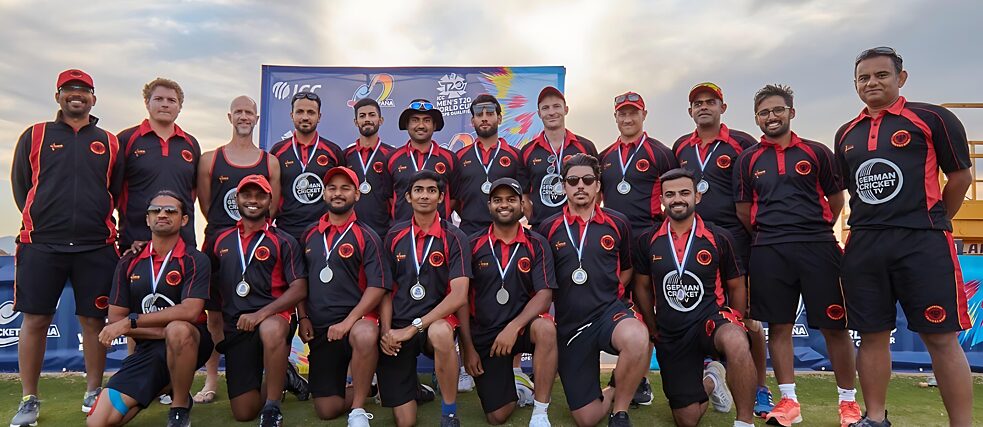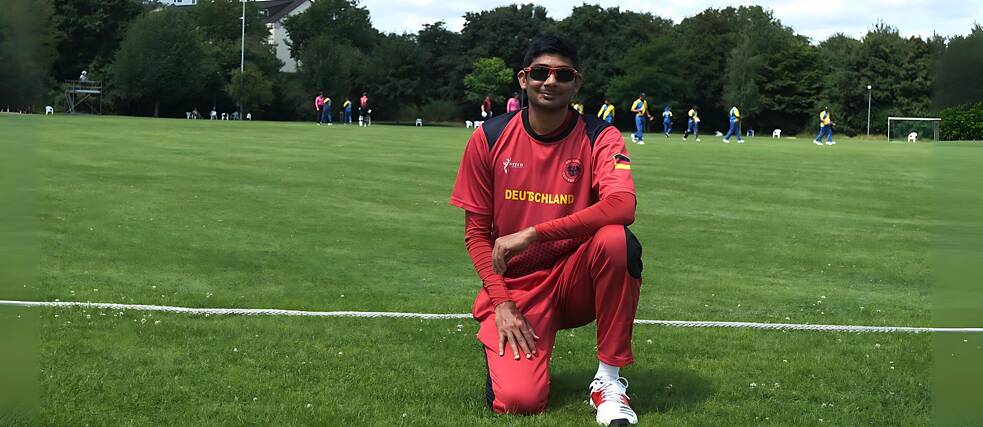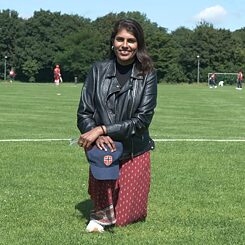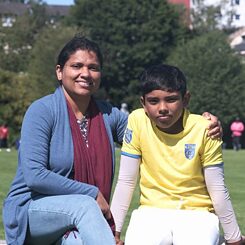An Insider’s Perspective
Cricket in Germany

As a cricket enthusiast, you might think you would miss your go-to sport in Germany. But with over three hundred clubs, cricket is booming, defying Germany’s reputation as a football-dominated nation. In this article, we speak with Venkatraman Ganesan, former captain of the German National Cricket Team, to gain insights into the growing cricket scene in Germany.
By Saurabh Narang
Cricket has a long history in Germany, dating back to the 18th century. A thriving scene once existed, particularly in Berlin, but World War I disrupted its growth. The sport’s post-war era saw a decline until the British forces reintroduced it.
Immigration from Asian countries in the 1960s and 1970s fuelled a renewed interest, leading to the establishment of a new German Cricket Federation (DCB) in 1988. This marked a significant step towards reviving cricket in Germany, culminating in its affiliation with the International Cricket Council in 1999.
Cricket is rapidly growing in Germany. The number of cricket teams has skyrocketed in recent years, increasing from just seventy to over three hundred now. This growth is largely driven by immigration from countries where cricket is immensely popular, like Afghanistan and India.
On the cricket field: Germany vs. Norway
From cricketing jargon like “Yeh aaney wala hai” (it’s coming) to “shabaash” (well done), the Krefeld Cricket Ground in North Rhine-Westphalia, Germany, buzzed with anticipation as the national teams of Germany and Norway faced off in a crucial European qualifying match for the 2026 Cricket T20 World Cup. The stands, though not overflowing, held a dedicated crowd cheering for their teams."Cricket brings people together," says Soly, an Indian expat living in Norway who came to support her husband Vinay playing for Norway. "Even away from home, it creates a community."
Soly is not alone. Cricket, once a niche sport in Germany, is gaining traction thanks to passionate immigrants like Biji, who discovered a welcoming club for her son just a year after arriving. "We were worried," says Biji, "but luckily we found a club led by the German captain himself!" Her son, a talented young player, is now competing in state league matches.
Meet Venkat – Former Captain of the German National Cricket Team

Venkatraman Ganesan, Former Captain of the German National Cricket Team | © Saurabh Narang
What is your professional background? How did you move to Germany and become involved in German cricket?
Professionally, I work at Henkel as a senior manager, leading an IT department focusing on SAP technology. I moved to Germany in 2012 via an internal job transfer from Accenture, India. The moving process was relatively smooth as it was work-based, and I had my employer’s support. Since 2017, I have been representing the German cricket team. In 2019, I took over the captaincy, and very recently, in July 2024, announced my retirement from international cricket.
Did you already play in India before coming to Germany and starting again?
Yes. I played for Tamil Nadu at the age group levels, under 14, 16, and 19. I also played in the Tamil Nadu first-division league setup. Back then, the first-division league was like the gateway to the Ranji Trophy (domestic first-class cricket championship in India). And so, until 2006, I pursued a path to be a professional cricketer. But after 2006, I decided to focus on my engineering career. Subsequently, I moved to Germany and was happily surprised to have found an active cricket club scene here.
How did your cricket journey transpire in Germany?
In the initial three years, I played cricket over the weekends as a hobby. Then, Germany started putting a structure in place, with a domestic competition similar to the Ranji Trophy in India. We had the Super Series with teams from various regions. This got me interested, and I started representing the Western Eagles from North Rhine-Westphalia. This got me noticed by the German cricket team, composed of the best twenty-four players from Germany. These players got shortlisted based on their domestic performances, representing various states. I scored a hundred in the very first match; the coach noticed it and that was my entry into the German team.
Do you have a favourite memory about playing for the German national team?
In 2021, we qualified for the ICC Europe regional finals, which was a pathway to the World Cup. That was a highlight for me as captain, taking Germany to the global qualifiers for the first time. The year after, we had a fantastic experience playing in Oman against teams like Ireland, UAE, and Canada, and we ran them close.
In your professional life, you are working in IT. Do you get support from your company to play cricket?
I neither play cricket professionally (being employed in IT) nor is there a full-fledged support system. I am thankful to my organisation for offering Sonderurlaub (special vacation), which allows around 10 days of paid time off apart from my regular vacation. Not everyone gets this, but I am grateful for it.
Did cricket help you integrate into German society, especially considering many cricketers in Germany are refugees from Afghanistan?
Cricket is not necessarily an integration factor for migrants who come for jobs. However, it allows you to connect with the sport you loved back home. In the German team, we have people from diverse cultures, and that is a strength. We bring distinctive styles of play to the table.
In my case, yes, cricket certainly was one of the factors. But it was not the only one. I originally moved for work, and therefore also had a circle of colleagues and friends who helped with the integration process, navigating through the initial hurdles. A major factor was the language to start with, but I gradually settled down and started to learn it, at least to manage from a social context.
There are around three hundred cricket clubs in Germany, but not many native German cricketers in the men's national team. Why is that?
Firstly, it is a time-consuming process. Secondly, cricket is not a familiar sport for Germans, so there is a need for popularising and campaigning.
What are some challenges cricketers face in Germany?
Since most of us are not professionals and have full-time jobs, sometimes 10-12 hours a day, it is difficult to train after work. This is a major hurdle compared to bigger teams where players can train more frequently. While we have the skills, maintaining consistency in training is tough. The other challenge is infrastructure. Krefeld offers great facilities, but we need similar setups across the country to provide players with proper training hubs.
Do you think cricket will become a full-time profession in Germany?
We are not quite there yet. But with cricket set on becoming an Olympic sport in 2028, the Deutscher Cricket Bund (DCB) will eventually join the Deutscher Olympischer Sportbund (DOSB), and there might be some prospects for “performance cricket” (an entertainment factor that generates revenue) in the future. It is a slow process that will require more investment, but hopefully, things will progress in that direction. It is essential if we want players to consider cricket as a serious career option.
How would you compare cricket in India and Germany?
It would be like comparing German football to Indian cricket. In India, there is a clear pathway for cricketers, which is something we need to develop in Germany to have a realistic chance of qualifying for World Cups.
How do you see the importance of cricket in Germany?
Cricket is the second most popular sport globally with a huge market. From a business perspective, it could be a good addition to the German sports scene. T20 cricket, in particular, is the format that could attract fans, so we need to develop pathways and infrastructure for this format.
What are your future plans related to cricket?
I do not have any specific plans at the moment. I do have some coaching qualifications (ECB Level 2) and coach the kids at my club, the Düsseldorf Blackcaps. Playing cricket already keeps me busy, so I have not made any detailed plans for the future.
(Note: This interview was edited for clarity and to keep the story concise.)

